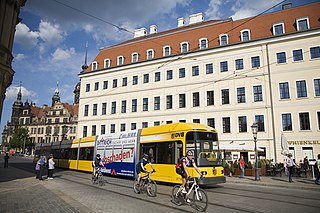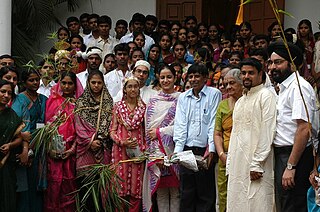
Greenwashing, also called green sheen, is a form of advertising or marketing spin that deceptively uses green PR and green marketing to persuade the public that an organization's products, goals, or policies are environmentally friendly. Companies that intentionally adopt greenwashing communication strategies often do so to distance themselves from their environmental lapses or those of their suppliers.
The Green Belt Movement (GBM) is an indigenous grassroots organization in Kenya that empowers women through the planting of trees. It is one of the most effective and well-known grassroots organisations addressing the problem of global deforestation. Professor Wangari Maathai established the organization in 1977 under the auspices of the National Council of Women of Kenya (NCWK). GBM's successes in forest conservation, education, and women's economic empowerment have gained the organisation worldwide acclaim. It is also noted for its advocacy of human rights, democratisation of access to public lands, and environmental justice issues such as the role of women's traditional ecological knowledge in addressing environmental degradation and desertification.

Zero waste, or waste minimization, is a set of principles focused on waste prevention that encourages redesigning resource life cycles so that all products are repurposed and/or reused. The goal of the movement is to avoid sending trash to landfills, incinerators, oceans, or any other part of the environment. Currently 9% of global plastic is recycled. In a zero waste system, all materials are reused until the optimum level of consumption is reached.

The Singapore Green Plan (SGP) was created in 1992 to ensure that the economic growth model of Singapore does not compromise the environment. The SGP sets out the strategies, programs and targets for Singapore to maintain a quality living environment while pursuing economic prosperity. The focus areas in the SGP are led by a main coordinating committee and respective action program committees. Since 1992, the SGP has been continuously updated to ensure its relevance, releasing SGP 2012 in 2002 and SGP 2030 in 2021. The United Nations (UN) Sustainable Development Goals (SDG) are correlated or mapped to the SGP.
Environmental issues in Pakistan include air pollution, water pollution, noise pollution, climate change, pesticide misuse, soil erosion, natural disasters, desertification and flooding. According to the 2020 edition of the environmental performance index (EPI) ranking released by Yale Center for Environmental Law & Policy, Pakistan ranks 142 with an EPI score of 33.1, an increase of 6.1 over a 10-year period. It ranked 180 in terms of air quality. The climatic changes and global warming are the most alarming issues risking millions of lives across the country. The major reasons of these environmental issues are carbon emissions, population explosion, and deforestation.

The Ministry of Environment is the South Korea branch of government charged with environmental protection. In addition to enforcing regulations and sponsoring ecological research, the Ministry manages the national parks of South Korea. Its headquarters is in Sejong City.

A sustainable city, eco-city, or green city is a city designed with consideration for social, economic, environmental impact, and resilient habitat for existing populations, without compromising the ability of future generations to experience the same. The UN Sustainable Development Goal 11 defines sustainable cities as those that are dedicated to achieving green sustainability, social sustainability and economic sustainability. They are committed to doing so by enabling opportunities for all through a design focused on inclusivity as well as maintaining a sustainable economic growth. The focus will also includes minimizing required inputs of energy, water, and food, and drastically reducing waste, output of heat, air pollution – CO2, methane, and water pollution. Richard Register, a visual artist, first coined the term ecocity in his 1987 book Ecocity Berkeley: Building Cities for a Healthy Future, where he offers innovative city planning solutions that would work anywhere. Other leading figures who envisioned sustainable cities are architect Paul F Downton, who later founded the company Ecopolis Pty Ltd, as well as authors Timothy Beatley and Steffen Lehmann, who have written extensively on the subject. The field of industrial ecology is sometimes used in planning these cities.

A green-collar worker is a worker who is employed in an environmental sector of the economy. Environmental green-collar workers satisfy the demand for green development. Generally, they implement environmentally conscious design, policy, and technology to improve conservation and sustainability. Formal environmental regulations as well as informal social expectations are pushing many firms to seek professionals with expertise with environmental, energy efficiency, and clean renewable energy issues. They often seek to make their output more sustainable, and thus more favorable to public opinion, governmental regulation, and the Earth's ecology.

Exnora International is a non-governmental environmental service organization started in 1989 in Chennai, Tamil Nadu, India, by M. B. Nirmal, a social activist. It focuses on preserving nature and preventing environmental degradation.

Armenia is underdeveloped in its waste management and recycling activities.

Recycling in Japan, an aspect of waste management in Japan, is based on the Japanese Container and Packaging Recycling Law. Plastic, paper, PET bottles, aluminium and glass are collected and recycled. Japan's country profile in Waste Atlas shows that in 2012 Recycling Rate was 20.8%.
Waste management in Japan today emphasizes not just the efficient and sanitary collection of waste, but also reduction in waste produced and recycling of waste when possible. This has been influenced by its history, particularly periods of significant economic expansion, as well as its geography as a mountainous country with limited space for landfills. Important forms of waste disposal include incineration, recycling and, to a smaller extent, landfills and land reclamation. Although Japan has made progress since the 1990s in reducing waste produced and encouraging recycling, there is still further progress to be made in reducing reliance on incinerators and the garbage sent to landfills. Challenges also exist in the processing of electronic waste and debris left after natural disasters.
A sustainability organization is (1) an organized group of people that aims to advance sustainability and/or (2) those actions of organizing something sustainably. Unlike many business organizations, sustainability organizations are not limited to implementing sustainability strategies which provide them with economic and cultural benefits attained through environmental responsibility. For sustainability organizations, sustainability can also be an end in itself without further justifications.

A circular economy is a model of resource production and consumption in any economy that involves sharing, leasing, reusing, repairing, refurbishing, and recycling existing materials and products for as long as possible. The concept aims to tackle global challenges such as climate change, biodiversity loss, waste, and pollution by emphasizing the design-based implementation of the three base principles of the model. The main three principles required for the transformation to a circular economy are: designing out waste and pollution, keeping products and materials in use, and regenerating natural systems. CE is defined in contradistinction to the traditional linear economy.
Waste management in Russia refers to the legislation, actions and processes pertaining to the management of the various waste types encountered throughout the Russian Federation. The basis of legal governance for waste management in Russia at the federal level is outlined through Federal Law No. 89-FZ, which defines waste as “the remains of raw materials, materials, semi-finished products, other articles or products that have been formed in the process of production or consumption as well as the goods (products) that have lost their consumer properties”.

The San Diego Climate Action Plan was adopted by the city of San Diego in December 2015. It is a local climate action plan whose rules are defined by the California global warming Solutions Act of 2006, with the goal of reducing greenhouse gas emissions. Through this plan, the city initially set goals of eliminating half of all greenhouse emissions and sourcing all energy from renewable sources by the year 2035. With a coalition of business owners, environmental advocates, and community leaders, Mayor Kevin Faulconer approved the Climate Action Plan. The Climate Action Plan consists of several policies to ensure the economic and environmental growth of the city of San Diego. It was referred to in The San Diego Union-Tribune as "the most aggressive climate action plan in California."

The Malta–Gozo Tunnel was a planned undersea tunnel between the islands of Malta and Gozo, both part of the Republic of Malta. The tunnel would have replaced the Gozo Channel Line, the current inter-island ferry service, between Ċirkewwa in Malta and Mġarr in Gozo.
In Egypt, waste and lack of proper management of it pose serious health and environmental problems for the country and its population. There has been some governmental attempts to better the system of waste management since the 1960s but those have not proven sufficient until now. In the last 10 years focus on this issue and solutions to it has increased both from the government and civil society. Some attempts at recycling are present, and growing in the country. But these are largely informal or private actors, and government initiatives are necessary to properly manage these systems and provide them with appropriate resources.

Environment and Ecology Bureau is one of the fifteen policy bureau of the Government of Hong Kong. The agency was established on 1 July 2022. The current Secretary for Environment and Ecology is Tse Chin-wan.












